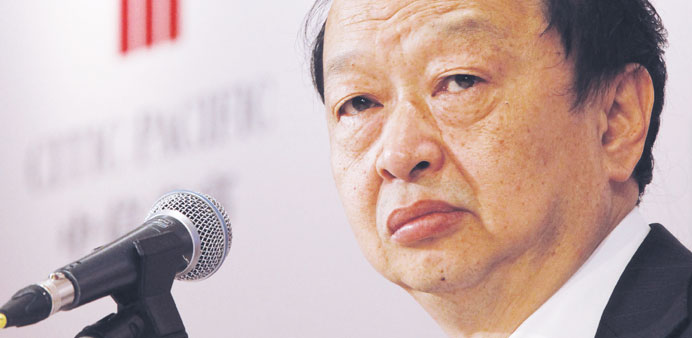Citic Pacific chairman Chang Zhenming is seen at a news conference in Hong Kong. The Chinese firm yesterday agreed to buy the main operating unit of its parent, state-backed Citic Group, for $36bn in a stock and cash deal.
Hong Kong’s Citic Pacific agreed to pay 226.9bn yuan ($36bn) to buy Chinese banking and brokerage assets from its state-owned parent, underscoring China’s push to loosen control over the economy.
The steelmaker and property developer will pay 49.9bn yuan in cash and issue almost 16.6bn shares at HK$13.48 each, according to a Hong Kong exchange filing yesterday. Citic Group Corp will hold 75% to 85% of Citic Pacific following the transaction and a share sale by the Hong Kong company, it said.
The transaction comes as Chinese President Xi Jinping advocates the most sweeping changes since Deng Xiaoping’s liberalisation in 1978, including loosening yuan trading and allowing more private investments in state businesses. The deal, which is the biggest asset injection into a Hong Kong-listed unit from China, may become a model for similar moves by state-owned enterprises.
“The mainland government wants to list most of the state-owned enterprises’ assets into public companies in order to improve corporate governance and operating efficiency,” Kenny Tang, general manager of Hong Kong-based AMTD Financial Planning, said by phone yesterday. “It’s quite a good effort to improve efficiency.”
Citic, the main operating unit of the group, has shareholder equity of 225bn yuan. Its financial-services holdings, including stakes in Citic Securities Co and China Citic Bank Corp, accounted for 87% of its pretax profit last year. Real estate, infrastructure and engineering assets accounted for most of the rest.
The purchase price represents 0.9 times the combined company’s book value from 2013 and 6.9 times last year’s earnings, according to a company presentation.
Shares of Citic Pacific, which will be renamed Citic Ltd, have climbed 13% since March 24, when trading in the stock was suspended for an announcement about the transaction. The rally gave it a market capitalisation of HK$52bn ($6.7bn) by the end of trading yesterday. The deal will be completed by August 29, the company said.
Citic Group, China’s first state-owned investment Corp, was set up in 1979 as part of Deng’s push to modernise and open up the state-controlled economy.
Moving the assets to Hong Kong may help improve corporate governance for the Beijing-based group, Kenneth Ho, a Hong Kong- based analyst at Goldman Sachs Group Inc, wrote on March 31.
Citic Group is not alone among Chinese state-owned enterprises in preparing to sell assets to private investors. China Petroleum & Chemical Corp, the refiner known as Sinopec, said in February that it plans to sell as much as 30% of its oil retail unit. PetroChina Co may allow private investment in areas including pipelines and gas exploration, Chairman Zhou Jiping has said.
At $36bn, the Citic deal would top China Mobile Ltd’s $32bn purchase of seven wireless networks from its parent to be the largest such asset injection into a Hong Kong unit by a Chinese company, data compiled by Bloomberg show.
The Citic transaction serves as a boon to Hong Kong after China’s largest e-commerce company, Alibaba Group Holding Ltd, abandoned plans to list in the city and said it will conduct its initial public offering in the US. Citic Pacific owns the Sino Iron project in Western Australia, a $9.9bn-magnetite iron ore mine that made its first shipment in December after delays and cost overruns. Citic Pacific said last month it faces pressure to write down the value of the project, which is the single largest foreign mining investment by a Chinese company.
Its 2013 profit climbed 9% to HK$7.6bn, even as losses at the iron-ore unit doubled.
The asset purchase will reduce a public float that currently stands at 42%, according to data compiled by Bloomberg. Hong Kong’s stock exchange requires companies to have at least 25% of their outstanding shares freely traded, though the limit can be reduced to 15% for firms with market capitalisation of more than HK$10bn.
The company will sell 4.68bn shares to raise funds for the transaction and to restore its public float, according to the filing yesterday.
About 50bn yuan will be raised from selling new shares to institutional investors, the companies said in a statement yesterday.
More shareholders and an improved credit profile following the transaction may give Citic Pacific more flexibility in raising funds, Janet Lu, a Hong Kong-based analyst at Goldman Sachs, said in a March 27 note.
“It is positive for the listed company because the new assets injected into the company can generate more than HK$30bn to HK$40bn a year,” AMTD’s Tang said. “It mitigates cash-flow problems at the listed company.”

